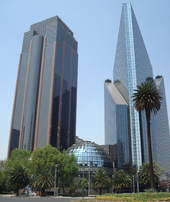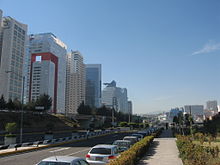Mexico City is one of the most important economic hubs in Latin America. The city proper (Federal District) produces 21.8% of the country'sgross domestic product. According to a study conducted by PricewaterhouseCoopers, Mexico City had a GDP of $390 billion, ranking as the eighth richest city in the world after the greater areas of Tokyo, New York, Los Angeles, Chicago, Paris, London and Osaka/Kobe, and the richest in Latin America. Making Mexico City alone the 30th largest economy in the world. Mexico City is the greatest contributor to the country's industrial GDP (15.8%) and also the greatest contributor to the country's GDP in the service sector (25.3%). Due to the limited non-urbanized space at the south—most of which is protected through environmental laws the contribution of the Federal District in agriculture is the smallest of all federal entities in the country. Mexico City has one of the world's fastest-growing economies and its GDP is set to double by 2020.
As measured by the overall GDP of the entire metropolitan area, Mexico City is the richest city in the country and Latin America. In the 2002 Mexico City had an HDI index of 0.915 identical to that of Republic of Korea. The level of household expenditure in Mexico City is close to that of an average household in Germany or Japan.
The top twenty-five percent of GDP per capita holders in the city had a mean disposable income of US $98,517 in 2007. The extremely high spending power of Mexico City inhabitants, makes the city attractive for luxury goods companies. The combined personal wealth of privately held income of citizens of the entire federal district is estimated to be $536.95 billion USD, $146 billion larger than the city's GDP of $390 billion, which only takes into account the combined net worth of goods, services and corporately held assets.
The economic reforms of President Carlos Salinas de Gortari had a tremendous effect on the city, as a number of businesses, including banks, were privatized. He also signed the North American Free Trade Agreement (NAFTA). This led to the decentralization and a shift in Mexico City's economic base, from manufacturing to services, as many factories moved to theState of Mexico and to the northern border.




No comments:
Post a Comment